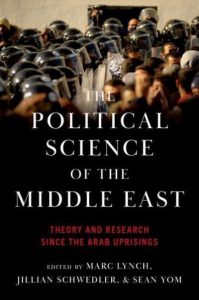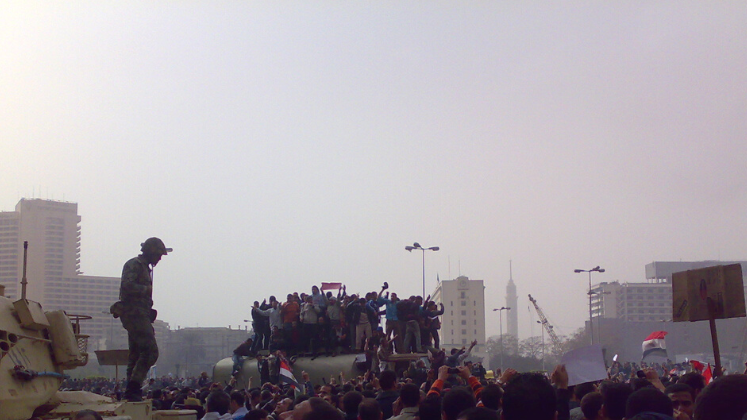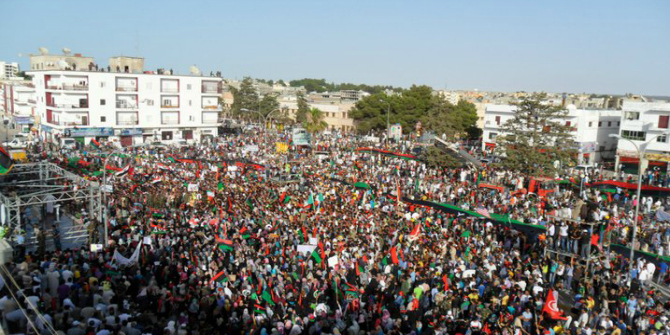In The Political Science of the Middle East: Theory and Research Since the Arab Uprisings, editors Marc Lynch, Jillian Schwedler and Sean Yom bring together contributors to give an ambitious overview of the concepts and case studies that have emerged in the literature on the Middle East and North Africa in the last decade. This rich collection will be a comprehensive resource for students, policymakers and researchers seeking detailed understanding of the region’s politics, writes Betul Dogan Akkas.
The Political Science of the Middle East: Theory and Research Since the Arab Uprisings. Marc Lynch, Jillian Schwedler and Sean Yom (eds). Oxford University Press. 2022.
 Find this book (affiliate link):
Find this book (affiliate link):![]()
Edited by Marc Lynch, Jillian Schwedler and Sean Yom, The Political Science of the Middle East offers an ambitious overview of the concepts and case studies that have emerged around Middle East and North Africa studies (MENA) literature in the last decade. The authors emphasise that the book has three purposes: firstly, to analyse new directions in studies of the Middle East after the Arab uprisings; secondly, to cultivate the immense theoretical contribution of regional expertise within political science; and thirdly, to give ‘testimony to the importance of intellectual collaboration’ by including almost 50 scholars. It is crucial to see researchers from various countries and backgrounds working together in the midst of a global pandemic. This collective intellectual effort offers a good example for graduate students in bringing together different approaches to produce knowledge in a collaborative manner.
The collection begins with Lynch’s introductory chapter, ‘The Project of Middle East Political Science: Research Agendas for a Maturing Field’, which describes the book’s general purpose, content and structure. Lynch states that there is little agreement concerning the uprisings in the Arab world, which are either praised or underestimated: ‘There is no consensus […] over when and how the Arab uprisings began and ended (if they did) or over how significant the Arab uprisings had really been’ (3).
While the Arab Spring has been overestimated and overstudied in the literature of the Middle East and its daily politics, its impacts are still evident. Rather than solely focusing on the outcomes of democracy protests, the contributors argue that the Arab revolts have had direct bearing on knowledge production in the region. In the words of May Darwich et al, ‘The MEIR [Middle East International Relations] subfield responded to the dizzying deluge of events with a remarkable outpouring of important and innovative new research. The Middle East has been at the forefront of broader IR scholarship on issues ranging from proxy wars and identity politics to shifting great politics’ (86).

Image Credot: Crop of ‘Army Trucks Surronding Tahrir Square, Cairo’ by Ramy Raoof licensed under CC BY 2.0
The concepts of ‘change’ and ‘post-Arab Spring regional politics’ are discussed conceptually and instrumentally in the chapters, which guide this knowledge production and enrich field studies of the region. The book does not comment on the outcomes of the protests or resent ‘parachute scholars’ ‘writing after only a brief time (or even no time) in the field’ (5). Instead, the chapters present conceptual and methodological reviews of literature on the Middle East. In addition to these discussions of research practices and agendas in the study of MENA, the book provides extensive and up-to-date reviews of sectarianism, political Islam, public opinion, militaries, protests, political economy and development, the politics of identity, migration and local politics.
In Chapter Twelve, Lisa Anderson discusses duress in the field and the academy. In the same vein as Chapter One, she concludes by summarising the main themes of the book and provides reflections on the practice of Middle East political science. Anderson defines The Political Science of the Middle East as representing ‘triumph over adversity’ (281). The purpose of her chapter is to provide a guide for reading and studying MENA in order to illustrate shifts in Middle East politics and the practice of political research in the region. According to Anderson, states are debilitated, leading to the decay of institutions, the fading of ideologies and the rise of personalist rulers who ‘give voice to the anxieties and aspirations brought on by failures of the old order’ (285).
Anderson also emphasises the role of societal actors in Middle East research. According to her, societies are exposed: ‘what was once dismissed as an inchoate and largely apathetic Arab or Middle Eastern “street” had proved to be both complex and, as the uprisings of 2011 showed, politically salient’ (286). Combining the unique nature of society with global trends requires better understanding of ‘the norms and practices by which people in such circumstances define, access, distribute, and use what they value’ (288). Scholarship on the Middle East and North Africa will benefit from recognising the varying practices and changing nature of regional politics ‘to forge a new political science, better suited to an era of momentous change, of mobility across different scales of space and time, identity, and belonging’ (288).
The edited volume covers several themes that merit attention at this point. While the book discusses alliances and conflicts, proxy wars, intra-regional conflicts and military interventions are three primary areas that do not receive a specific chapter. Considering the Israeli occupation, wars in Yemen and Syria as well as internal conflict in Libya and Iraq, military tensions in the region could have been given one or two more chapters.
The Political Science of the Middle East contributes significantly to the field of MENA studies as it not only provides guidance on the practices of regional research, but also offers deep and advanced analysis of the topics covered. For anyone interested in reading an in-depth discussion of specific sub-research areas in MENA studies, the book is a comprehensive resource. Students, policymakers and independent researchers seeking detailed understanding of regional politics in relation to the concepts and themes detailed above will find a rich collection.
Note: This review gives the views of the author, and not the position of the LSE Review of Books blog, or of the London School of Economics and Political Science. The LSE RB blog may receive a small commission if you choose to make a purchase through the above Amazon affiliate link. This is entirely independent of the coverage of the book on LSE Review of Books.







